Analysis of Major Sustainability Theories and Frameworks
VerifiedAdded on 2022/08/24
|8
|1360
|32
Report
AI Summary
This report provides an in-depth analysis of three prominent sustainability theories: Systems Theory, the Theory of Corporate Social Responsibility (CSR), and Stakeholder Theory. Systems Theory emphasizes the interconnectedness of social, ecological, and economic systems, highlighting how changes in one area impact the others. The CSR theory outlines a phased approach to corporate responsibility, including economic, social, environmental, legal, and philanthropic dimensions, supporting the triple bottom line. Stakeholder Theory advocates for maximizing the interests and safeguarding the rights of all stakeholders associated with a corporation, emphasizing ethical business practices for long-term growth and competitive advantage. The report references key authors and provides a comprehensive overview of each theory's core components and implications for sustainable business practices. The report also includes a list of references that were used to complete this assignment.
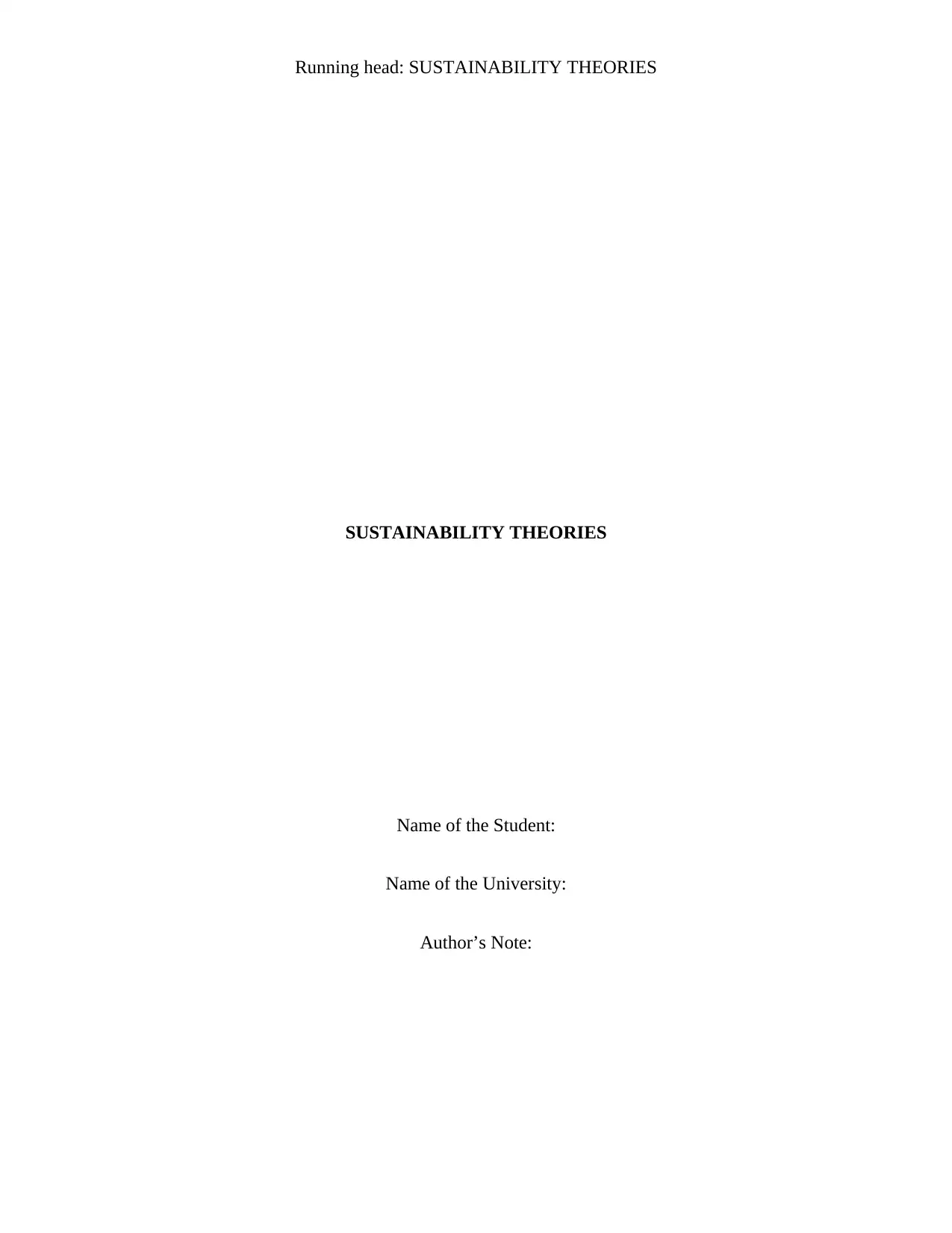
Running head: SUSTAINABILITY THEORIES
SUSTAINABILITY THEORIES
Name of the Student:
Name of the University:
Author’s Note:
SUSTAINABILITY THEORIES
Name of the Student:
Name of the University:
Author’s Note:
Paraphrase This Document
Need a fresh take? Get an instant paraphrase of this document with our AI Paraphraser

Running head: SUSTAINABILITY THEORIES
Name of the
Sustainability
Theory
Year
Introduce
d
Theorist/ Author Key Components
Systems
Theory
1950s Ludwig von Bertalanffy,
Anatol Rapoport, Talcott
Parsons, William Ross
Ashby, Kenneth E.
Boulding and others
The theory assumes that the social, ecological and the economic
systems are all interrelated and a change in one of these systems would
affect the entire system of sustainability (Clayton & Radcliffe, 2018).
The social system primarily refers to the society or the societal factors
which the corporations need to take into account and also contribute
towards the same positively for the attainment of sustainability (Plaza‐
Úbeda et al., 2019).
The ecological system refers to the environment or the environmental
factors and thus the corporations for the attainment of sustainability are
not only required to reduce the damage caused by them towards the
environment but also to positively contribute towards the improvement
of the condition of the same (Gianni, Gotzamani & Tsiotras, 2017).
The economic system refers to the economy of the nations or for that
matter the region in which the corporations are operational and the
Name of the
Sustainability
Theory
Year
Introduce
d
Theorist/ Author Key Components
Systems
Theory
1950s Ludwig von Bertalanffy,
Anatol Rapoport, Talcott
Parsons, William Ross
Ashby, Kenneth E.
Boulding and others
The theory assumes that the social, ecological and the economic
systems are all interrelated and a change in one of these systems would
affect the entire system of sustainability (Clayton & Radcliffe, 2018).
The social system primarily refers to the society or the societal factors
which the corporations need to take into account and also contribute
towards the same positively for the attainment of sustainability (Plaza‐
Úbeda et al., 2019).
The ecological system refers to the environment or the environmental
factors and thus the corporations for the attainment of sustainability are
not only required to reduce the damage caused by them towards the
environment but also to positively contribute towards the improvement
of the condition of the same (Gianni, Gotzamani & Tsiotras, 2017).
The economic system refers to the economy of the nations or for that
matter the region in which the corporations are operational and the
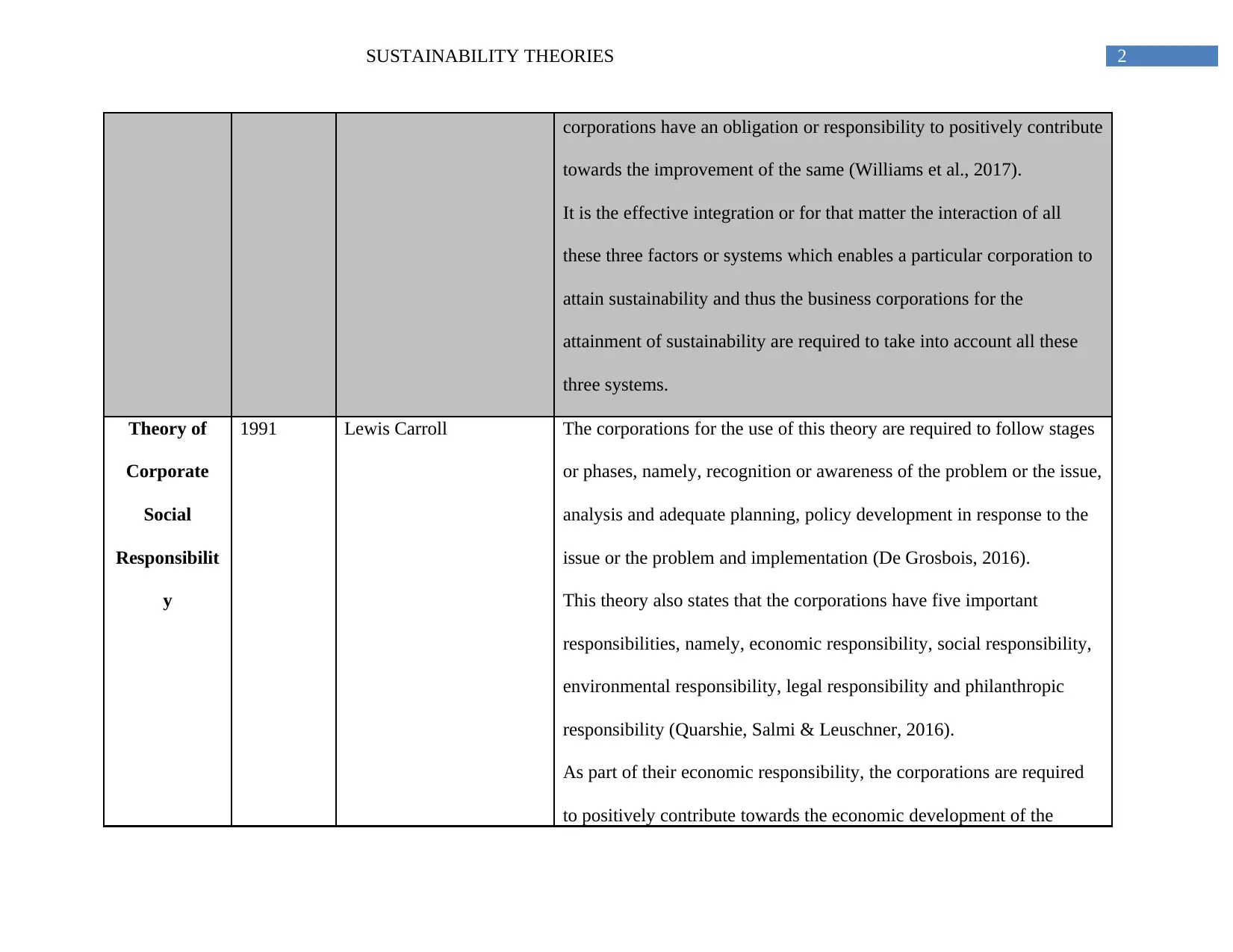
2SUSTAINABILITY THEORIES
corporations have an obligation or responsibility to positively contribute
towards the improvement of the same (Williams et al., 2017).
It is the effective integration or for that matter the interaction of all
these three factors or systems which enables a particular corporation to
attain sustainability and thus the business corporations for the
attainment of sustainability are required to take into account all these
three systems.
Theory of
Corporate
Social
Responsibilit
y
1991 Lewis Carroll The corporations for the use of this theory are required to follow stages
or phases, namely, recognition or awareness of the problem or the issue,
analysis and adequate planning, policy development in response to the
issue or the problem and implementation (De Grosbois, 2016).
This theory also states that the corporations have five important
responsibilities, namely, economic responsibility, social responsibility,
environmental responsibility, legal responsibility and philanthropic
responsibility (Quarshie, Salmi & Leuschner, 2016).
As part of their economic responsibility, the corporations are required
to positively contribute towards the economic development of the
corporations have an obligation or responsibility to positively contribute
towards the improvement of the same (Williams et al., 2017).
It is the effective integration or for that matter the interaction of all
these three factors or systems which enables a particular corporation to
attain sustainability and thus the business corporations for the
attainment of sustainability are required to take into account all these
three systems.
Theory of
Corporate
Social
Responsibilit
y
1991 Lewis Carroll The corporations for the use of this theory are required to follow stages
or phases, namely, recognition or awareness of the problem or the issue,
analysis and adequate planning, policy development in response to the
issue or the problem and implementation (De Grosbois, 2016).
This theory also states that the corporations have five important
responsibilities, namely, economic responsibility, social responsibility,
environmental responsibility, legal responsibility and philanthropic
responsibility (Quarshie, Salmi & Leuschner, 2016).
As part of their economic responsibility, the corporations are required
to positively contribute towards the economic development of the
⊘ This is a preview!⊘
Do you want full access?
Subscribe today to unlock all pages.

Trusted by 1+ million students worldwide

3SUSTAINABILITY THEORIES
regions or for that matter the regions in which they are operational (Lim
& Greenwood, 2017).
As part of their social responsibility, the corporations are required to
positively contribute towards the social or for that matter the societal
development of the regions or the nations in which they are operational
(Frynas & Yamahaki, 2016).
As part of their environmental responsibility, the corporations are
required to reduce the environmental damage caused by them to the
environment through their business activities and also undertake the
kind of initiatives which are likely to improve the condition of the
environment (Quarshie, Salmi & Leuschner, 2016).
As part of their philanthropic responsibility, the corporations are
required to indulge in the kind of actions or for that matter undertake
the kind of initiatives which are likely to contribute towards the
improvement of the quality of life that the individuals lead and also
make the world a better place to live in through the resolution of the
regions or for that matter the regions in which they are operational (Lim
& Greenwood, 2017).
As part of their social responsibility, the corporations are required to
positively contribute towards the social or for that matter the societal
development of the regions or the nations in which they are operational
(Frynas & Yamahaki, 2016).
As part of their environmental responsibility, the corporations are
required to reduce the environmental damage caused by them to the
environment through their business activities and also undertake the
kind of initiatives which are likely to improve the condition of the
environment (Quarshie, Salmi & Leuschner, 2016).
As part of their philanthropic responsibility, the corporations are
required to indulge in the kind of actions or for that matter undertake
the kind of initiatives which are likely to contribute towards the
improvement of the quality of life that the individuals lead and also
make the world a better place to live in through the resolution of the
Paraphrase This Document
Need a fresh take? Get an instant paraphrase of this document with our AI Paraphraser
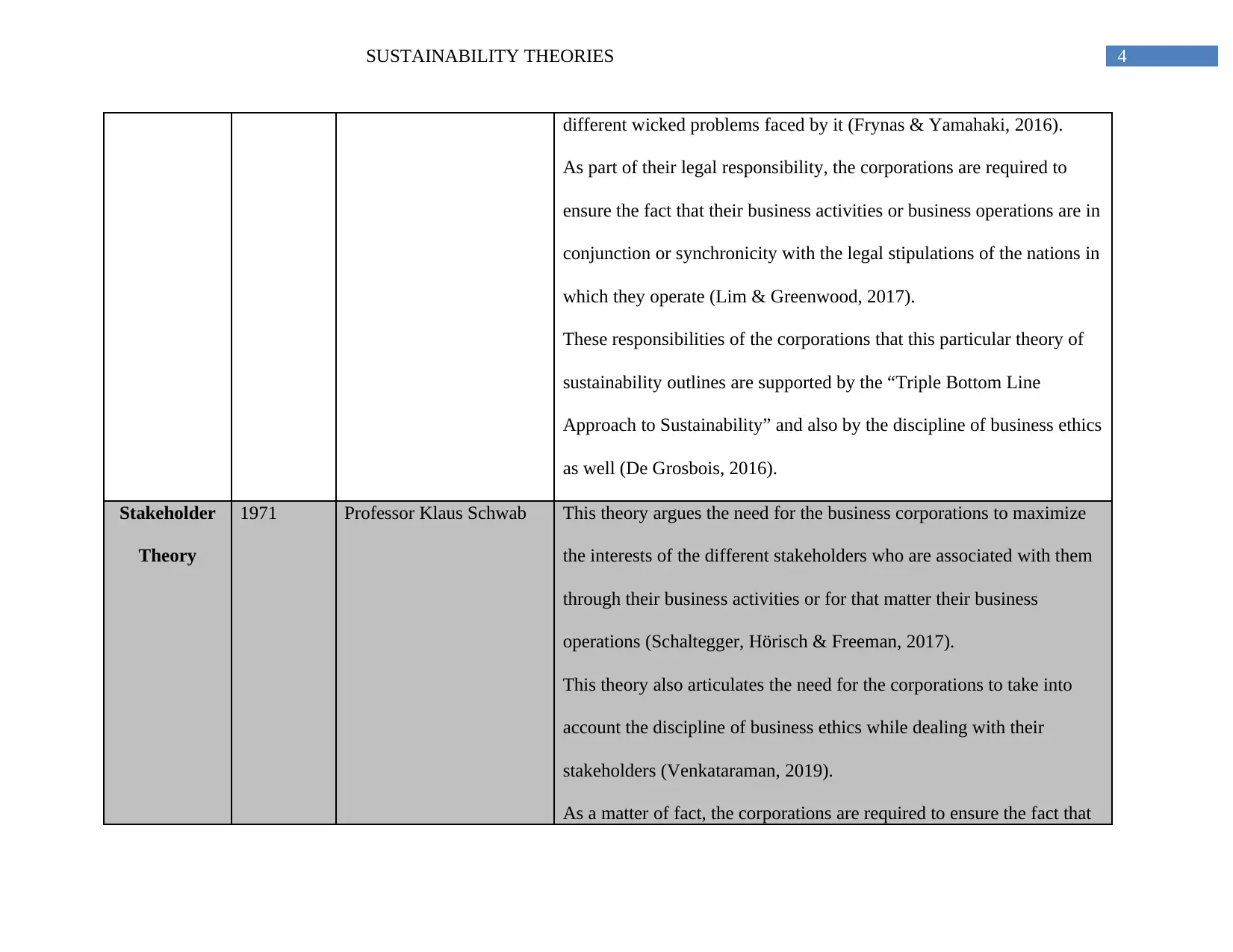
4SUSTAINABILITY THEORIES
different wicked problems faced by it (Frynas & Yamahaki, 2016).
As part of their legal responsibility, the corporations are required to
ensure the fact that their business activities or business operations are in
conjunction or synchronicity with the legal stipulations of the nations in
which they operate (Lim & Greenwood, 2017).
These responsibilities of the corporations that this particular theory of
sustainability outlines are supported by the “Triple Bottom Line
Approach to Sustainability” and also by the discipline of business ethics
as well (De Grosbois, 2016).
Stakeholder
Theory
1971 Professor Klaus Schwab This theory argues the need for the business corporations to maximize
the interests of the different stakeholders who are associated with them
through their business activities or for that matter their business
operations (Schaltegger, Hörisch & Freeman, 2017).
This theory also articulates the need for the corporations to take into
account the discipline of business ethics while dealing with their
stakeholders (Venkataraman, 2019).
As a matter of fact, the corporations are required to ensure the fact that
different wicked problems faced by it (Frynas & Yamahaki, 2016).
As part of their legal responsibility, the corporations are required to
ensure the fact that their business activities or business operations are in
conjunction or synchronicity with the legal stipulations of the nations in
which they operate (Lim & Greenwood, 2017).
These responsibilities of the corporations that this particular theory of
sustainability outlines are supported by the “Triple Bottom Line
Approach to Sustainability” and also by the discipline of business ethics
as well (De Grosbois, 2016).
Stakeholder
Theory
1971 Professor Klaus Schwab This theory argues the need for the business corporations to maximize
the interests of the different stakeholders who are associated with them
through their business activities or for that matter their business
operations (Schaltegger, Hörisch & Freeman, 2017).
This theory also articulates the need for the corporations to take into
account the discipline of business ethics while dealing with their
stakeholders (Venkataraman, 2019).
As a matter of fact, the corporations are required to ensure the fact that
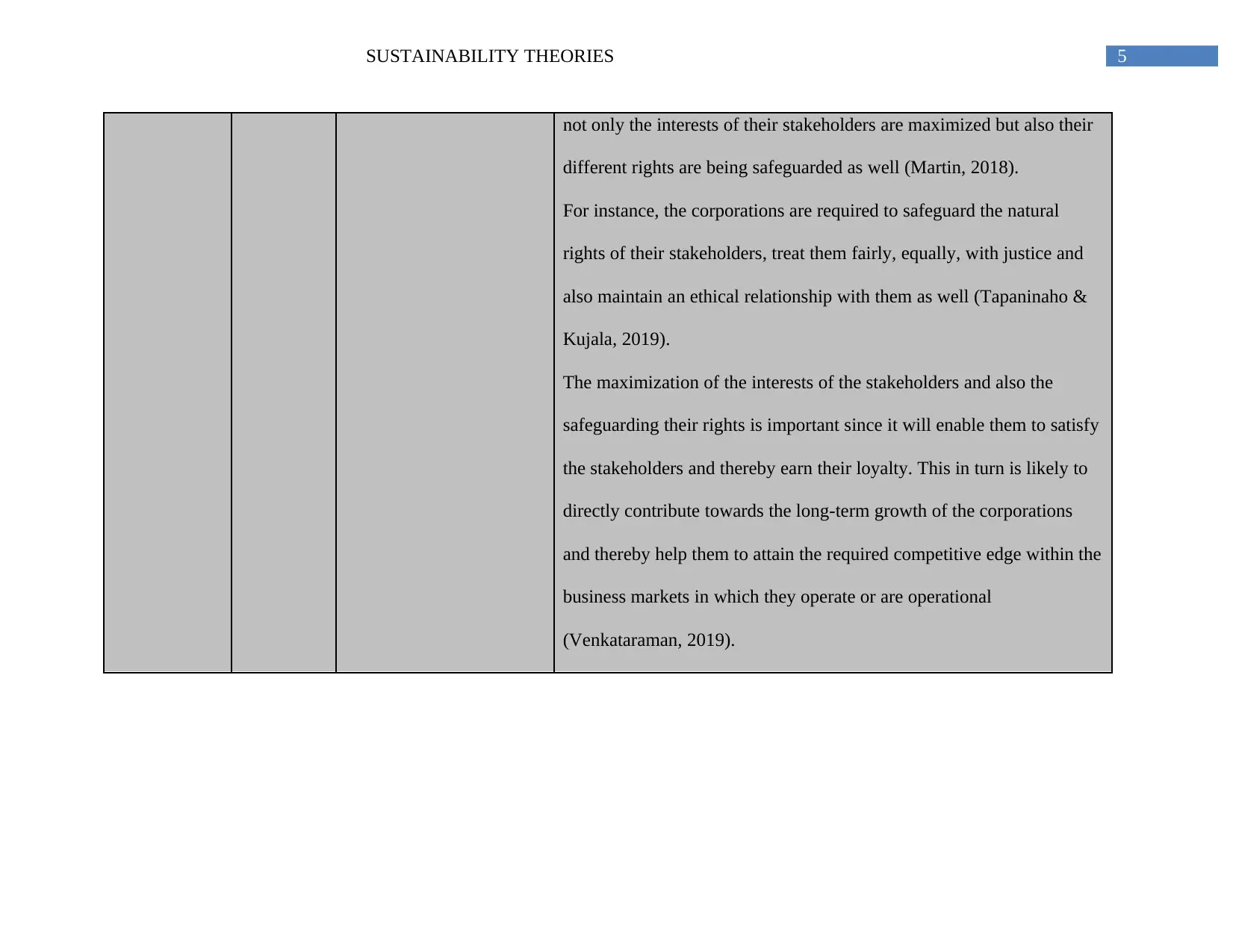
5SUSTAINABILITY THEORIES
not only the interests of their stakeholders are maximized but also their
different rights are being safeguarded as well (Martin, 2018).
For instance, the corporations are required to safeguard the natural
rights of their stakeholders, treat them fairly, equally, with justice and
also maintain an ethical relationship with them as well (Tapaninaho &
Kujala, 2019).
The maximization of the interests of the stakeholders and also the
safeguarding their rights is important since it will enable them to satisfy
the stakeholders and thereby earn their loyalty. This in turn is likely to
directly contribute towards the long-term growth of the corporations
and thereby help them to attain the required competitive edge within the
business markets in which they operate or are operational
(Venkataraman, 2019).
not only the interests of their stakeholders are maximized but also their
different rights are being safeguarded as well (Martin, 2018).
For instance, the corporations are required to safeguard the natural
rights of their stakeholders, treat them fairly, equally, with justice and
also maintain an ethical relationship with them as well (Tapaninaho &
Kujala, 2019).
The maximization of the interests of the stakeholders and also the
safeguarding their rights is important since it will enable them to satisfy
the stakeholders and thereby earn their loyalty. This in turn is likely to
directly contribute towards the long-term growth of the corporations
and thereby help them to attain the required competitive edge within the
business markets in which they operate or are operational
(Venkataraman, 2019).
⊘ This is a preview!⊘
Do you want full access?
Subscribe today to unlock all pages.

Trusted by 1+ million students worldwide
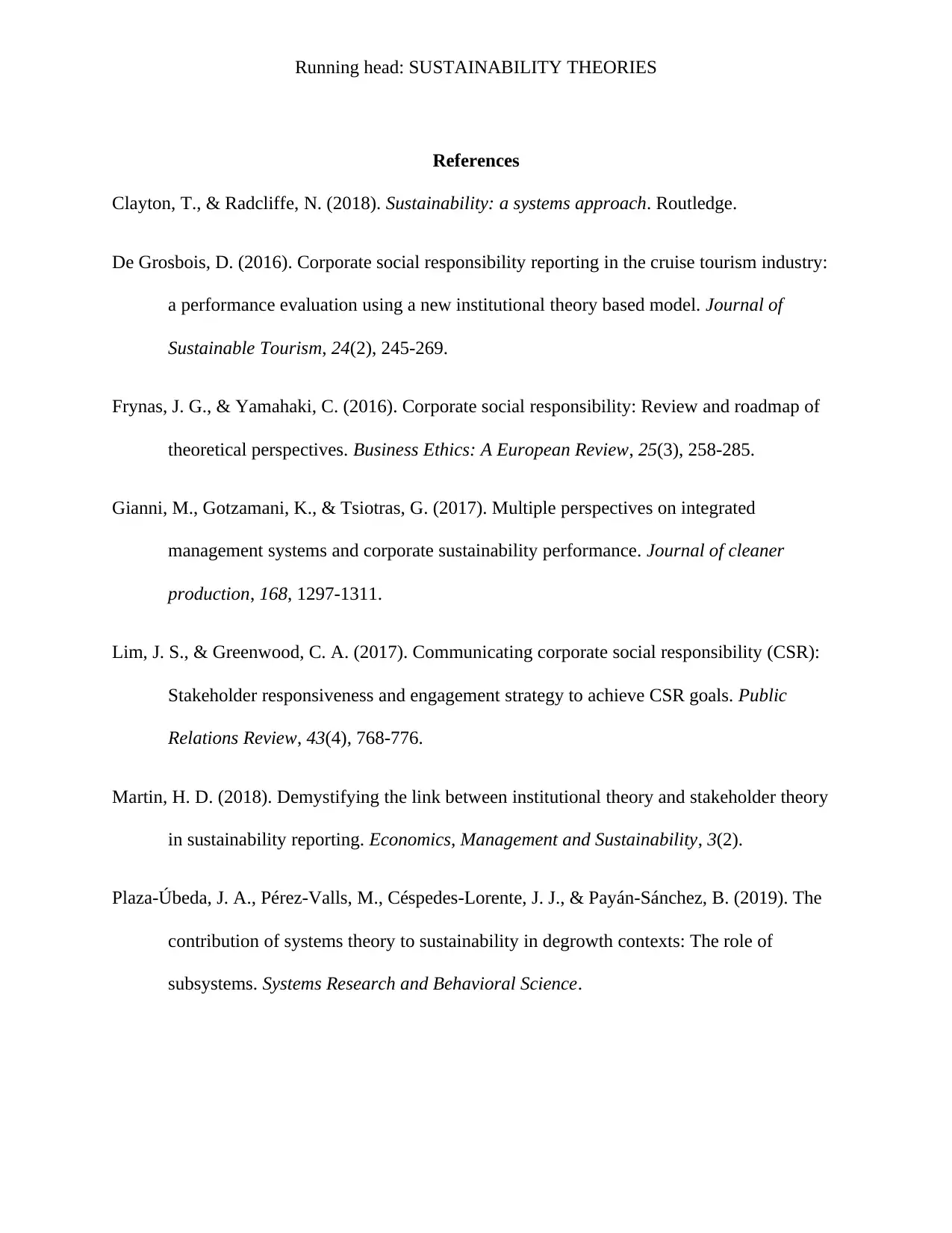
Running head: SUSTAINABILITY THEORIES
References
Clayton, T., & Radcliffe, N. (2018). Sustainability: a systems approach. Routledge.
De Grosbois, D. (2016). Corporate social responsibility reporting in the cruise tourism industry:
a performance evaluation using a new institutional theory based model. Journal of
Sustainable Tourism, 24(2), 245-269.
Frynas, J. G., & Yamahaki, C. (2016). Corporate social responsibility: Review and roadmap of
theoretical perspectives. Business Ethics: A European Review, 25(3), 258-285.
Gianni, M., Gotzamani, K., & Tsiotras, G. (2017). Multiple perspectives on integrated
management systems and corporate sustainability performance. Journal of cleaner
production, 168, 1297-1311.
Lim, J. S., & Greenwood, C. A. (2017). Communicating corporate social responsibility (CSR):
Stakeholder responsiveness and engagement strategy to achieve CSR goals. Public
Relations Review, 43(4), 768-776.
Martin, H. D. (2018). Demystifying the link between institutional theory and stakeholder theory
in sustainability reporting. Economics, Management and Sustainability, 3(2).
Plaza‐Úbeda, J. A., Pérez‐Valls, M., Céspedes‐Lorente, J. J., & Payán‐Sánchez, B. (2019). The
contribution of systems theory to sustainability in degrowth contexts: The role of
subsystems. Systems Research and Behavioral Science.
References
Clayton, T., & Radcliffe, N. (2018). Sustainability: a systems approach. Routledge.
De Grosbois, D. (2016). Corporate social responsibility reporting in the cruise tourism industry:
a performance evaluation using a new institutional theory based model. Journal of
Sustainable Tourism, 24(2), 245-269.
Frynas, J. G., & Yamahaki, C. (2016). Corporate social responsibility: Review and roadmap of
theoretical perspectives. Business Ethics: A European Review, 25(3), 258-285.
Gianni, M., Gotzamani, K., & Tsiotras, G. (2017). Multiple perspectives on integrated
management systems and corporate sustainability performance. Journal of cleaner
production, 168, 1297-1311.
Lim, J. S., & Greenwood, C. A. (2017). Communicating corporate social responsibility (CSR):
Stakeholder responsiveness and engagement strategy to achieve CSR goals. Public
Relations Review, 43(4), 768-776.
Martin, H. D. (2018). Demystifying the link between institutional theory and stakeholder theory
in sustainability reporting. Economics, Management and Sustainability, 3(2).
Plaza‐Úbeda, J. A., Pérez‐Valls, M., Céspedes‐Lorente, J. J., & Payán‐Sánchez, B. (2019). The
contribution of systems theory to sustainability in degrowth contexts: The role of
subsystems. Systems Research and Behavioral Science.
Paraphrase This Document
Need a fresh take? Get an instant paraphrase of this document with our AI Paraphraser
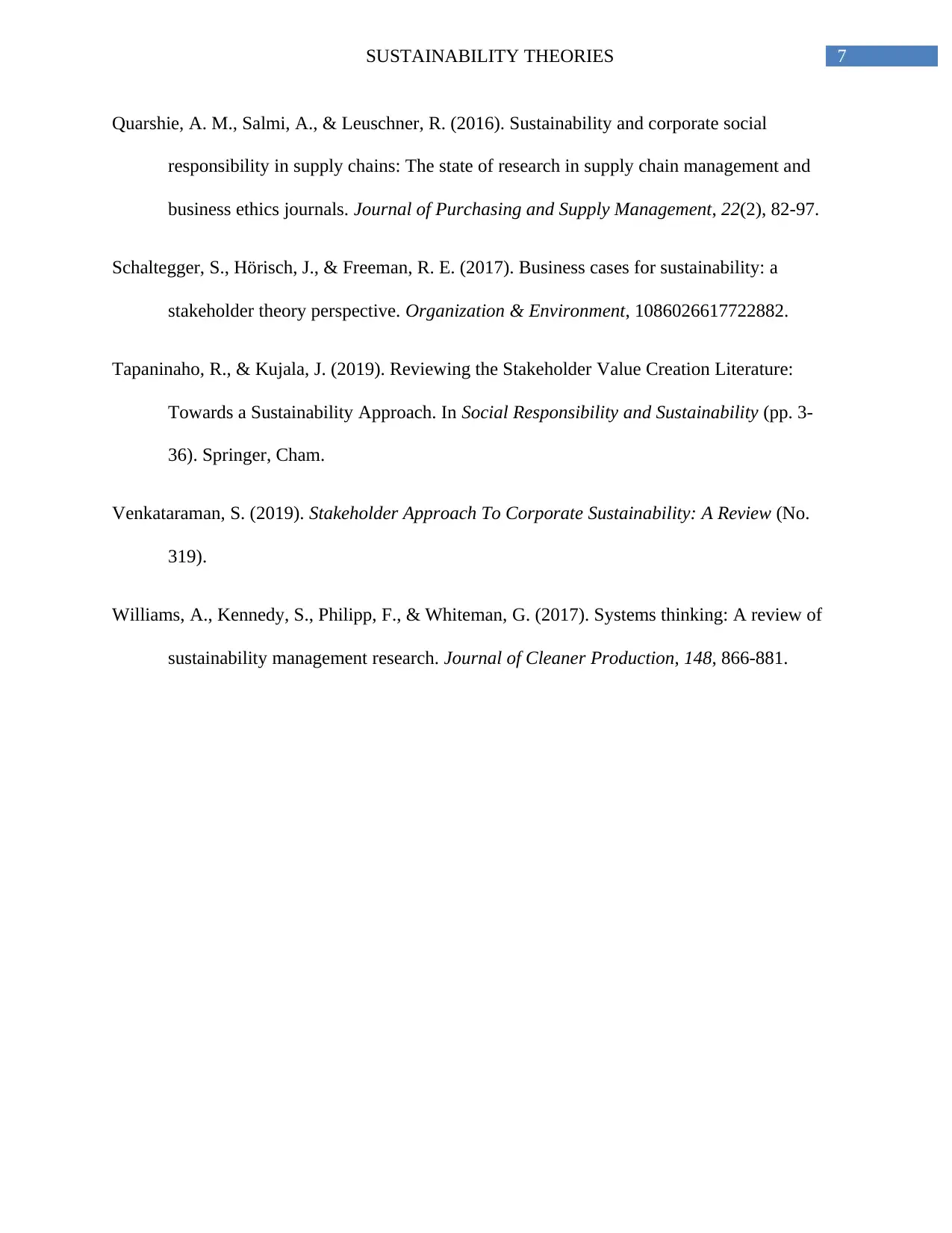
7SUSTAINABILITY THEORIES
Quarshie, A. M., Salmi, A., & Leuschner, R. (2016). Sustainability and corporate social
responsibility in supply chains: The state of research in supply chain management and
business ethics journals. Journal of Purchasing and Supply Management, 22(2), 82-97.
Schaltegger, S., Hörisch, J., & Freeman, R. E. (2017). Business cases for sustainability: a
stakeholder theory perspective. Organization & Environment, 1086026617722882.
Tapaninaho, R., & Kujala, J. (2019). Reviewing the Stakeholder Value Creation Literature:
Towards a Sustainability Approach. In Social Responsibility and Sustainability (pp. 3-
36). Springer, Cham.
Venkataraman, S. (2019). Stakeholder Approach To Corporate Sustainability: A Review (No.
319).
Williams, A., Kennedy, S., Philipp, F., & Whiteman, G. (2017). Systems thinking: A review of
sustainability management research. Journal of Cleaner Production, 148, 866-881.
Quarshie, A. M., Salmi, A., & Leuschner, R. (2016). Sustainability and corporate social
responsibility in supply chains: The state of research in supply chain management and
business ethics journals. Journal of Purchasing and Supply Management, 22(2), 82-97.
Schaltegger, S., Hörisch, J., & Freeman, R. E. (2017). Business cases for sustainability: a
stakeholder theory perspective. Organization & Environment, 1086026617722882.
Tapaninaho, R., & Kujala, J. (2019). Reviewing the Stakeholder Value Creation Literature:
Towards a Sustainability Approach. In Social Responsibility and Sustainability (pp. 3-
36). Springer, Cham.
Venkataraman, S. (2019). Stakeholder Approach To Corporate Sustainability: A Review (No.
319).
Williams, A., Kennedy, S., Philipp, F., & Whiteman, G. (2017). Systems thinking: A review of
sustainability management research. Journal of Cleaner Production, 148, 866-881.
1 out of 8
Related Documents
Your All-in-One AI-Powered Toolkit for Academic Success.
+13062052269
info@desklib.com
Available 24*7 on WhatsApp / Email
![[object Object]](/_next/static/media/star-bottom.7253800d.svg)
Unlock your academic potential
Copyright © 2020–2026 A2Z Services. All Rights Reserved. Developed and managed by ZUCOL.




